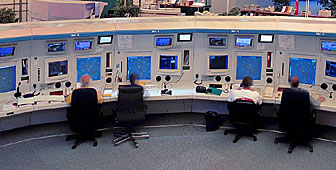Air traffic controller admits failure of system

The air traffic controller on duty on the night of the fatal mid-air collision two weeks ago has acknowledged that network errors contributed to the disaster.
In a statement, the air traffic controller said he was part of a network of people, computers, surveillance and communications equipment that failed when a Russian passenger plane and a cargo plane collided over southern Germany.
“This tragic accident only happened because there were shortcomings in the network,” he said further. He added that it was his duty and responsibility to do everything to prevent such accidents.
“I feel for the relatives of the victims and express my condolences to all those who lost a loved one,” he said in the statement that was published through his lawyer.
The controller, who has not been named, said he was prepared to provide the relevant authorities with the necessary information and added that he had already testified to the German aircraft accident investigation bureau.
Skyguide, the Swiss air traffic controller, has come under fire for only having one person on duty. Analysis of the flight voice recorders has also shown that the pilots were given contradictory instructions just prior to the collision.
Seventy-one people – most of them children – died in the crash that happened over Lake Constance on July 1.
Swiss response
During a memorial service in Überlingen, Germany, the Swiss transport minister, Moritz Leuenberger, admitted that mistakes were made in the Swiss response to last week’s fatal air crash.
Leuenberger said Switzerland would do all it could to help the investigation into what caused the crash and who bore responsibility for it.
His comments came as the Swiss government announced that the president, Kaspar Villiger, would not attend a memorial service in Russia on Saturday, because the authorities could not guarantee his safety.
Leuenberger also promised that Switzerland would provide financial support to the families of the mainly Russian victims.
Misleading information
Leuenberger said Skyguide had mishandled its response, with misleading information issued in the immediate aftermath of the tragedy.
“Faced with the terrible thought that we share responsibility for the deaths of 71 people, we reacted at first with uncertainty, with confused and misleading information and made omissions,” Leuenberger said.
But he said Switzerland was committed to doing everything it could to help the accident inquiry and to support the victims’ families.
“Switzerland will ensure… that the victims and their families receive help and compensation as required by law,” the transport minister said.
Feelings running high
Meanwhile, the government said Villiger decided not to attend the memorial service as he was following the advice from local officials in Ufa, the capital of the republic of Bashkortostan, where the service took place on Saturday.
“The Russian Foreign Ministry… informed the Swiss embassy that as of Thursday evening emotions had risen to such a level that the safety of the Swiss delegation on the ground on Saturday would have been at risk,” Villiger’s Finance Ministry said in a statement.
According to the Russian Interfax news agency, local leaders in Bashkortostan had opposed Villiger’s attendance at the memorial in protest at Switzerland’s initial reaction to the crash.
“The Swiss president and other officials are welcome at any time, but not on the day of the funerals,” Interfax quoted Bashkortostan’s first deputy prime minister, Khalyaf Ishmuratov, as saying.
“In the first days after the disaster the Swiss, in defiance of ethical standards, accused the Bashkirian pilots of incompetence and placed the blame on them,” Ishmuratov said.
Villiger had been due to lay a wreath at the memorial and express the Swiss government’s sympathy with the families of the victims.
Most of those who died were children from the southern Russian republic, who were travelling to Spain on holiday.
swissinfo

In compliance with the JTI standards
More: SWI swissinfo.ch certified by the Journalism Trust Initiative
You can find an overview of ongoing debates with our journalists here . Please join us!
If you want to start a conversation about a topic raised in this article or want to report factual errors, email us at english@swissinfo.ch.